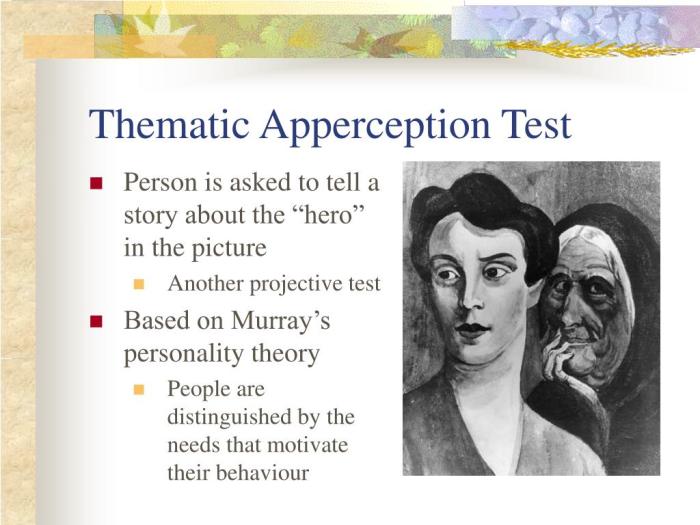The Temas Multicultural Thematic Apperception Test (TMTAT) stands as a groundbreaking assessment tool, meticulously crafted to unravel the intricate tapestry of cultural influences and identity formation. This comprehensive overview delves into the TMTAT’s theoretical underpinnings, psychometric properties, clinical applications, and ethical considerations, providing a profound understanding of its invaluable contributions to the field of multicultural assessment.
The TMTAT, a culturally sensitive instrument, empowers clinicians to navigate the complexities of cultural factors and their impact on an individual’s psychological well-being. Its multifaceted approach enables a deeper understanding of cultural identity, acculturation experiences, and the interplay between culture and psychopathology.
Overview of the Temas Multicultural Thematic Apperception Test (TMTAT)

The Temas Multicultural Thematic Apperception Test (TMTAT) is a projective assessment tool designed to assess cultural factors, identity issues, and psychological functioning in diverse populations. It was developed by J. Manuel Casas and associates to address the need for a culturally sensitive measure that could capture the complex interplay of culture and psychology.
The TMTAT is based on the theoretical framework of multicultural psychology, which recognizes the importance of cultural context in shaping individual experiences, behaviors, and mental processes. The test uses a series of ambiguous images to elicit stories from participants, which are then analyzed for themes related to cultural identity, acculturation, and mental health.
Administration and Scoring of the TMTAT
The TMTAT is typically administered individually in a clinical setting. The examiner presents the participant with a series of 12 images and asks them to tell a story about each image. The stories are audio-recorded and later transcribed for analysis.
The TMTAT is scored using a manualized system that evaluates the stories for themes related to cultural identity, acculturation, and mental health. The scoring system is designed to be culturally sensitive and to minimize bias.
Psychometric Properties of the TMTAT
The TMTAT has been shown to have good reliability and validity. Studies have found that the test is reliable over time and across different raters. The test has also been shown to be valid in assessing cultural identity, acculturation, and mental health.
The TMTAT has been compared to other multicultural assessment tools, such as the Multicultural Personality Questionnaire (MPQ) and the Cross-Cultural Inventory of Personality (CCIP). Studies have found that the TMTAT is comparable to these other tools in terms of reliability and validity.
Clinical Applications of the TMTAT
The TMTAT can be used in a variety of clinical settings to assess cultural factors and identity issues. The test can be used to:
- Identify cultural factors that may be contributing to psychological distress
- Assess the level of acculturation and its impact on mental health
- Identify cultural strengths and resources that can be used to promote healing
- Develop culturally sensitive treatment plans
Ethical Considerations in Using the TMTAT, Temas multicultural thematic apperception test
The use of the TMTAT raises several ethical considerations. It is important to ensure that the test is used in a culturally sensitive manner and that the results are interpreted in a way that minimizes bias. It is also important to obtain informed consent from participants before administering the test.
The following guidelines can help to ensure the ethical use of the TMTAT:
- Use the test only with individuals who are culturally competent
- Obtain informed consent from participants before administering the test
- Interpret the results in a way that minimizes bias
- Use the results to develop culturally sensitive treatment plans
Future Directions for Research on the TMTAT
There are several areas for future research on the TMTAT. These include:
- Developing new scoring protocols for the TMTAT
- Examining the relationship between the TMTAT and other multicultural assessment tools
- Investigating the use of the TMTAT in different clinical settings
- Developing training programs for clinicians on the use of the TMTAT
Popular Questions
What is the purpose of the TMTAT?
The TMTAT aims to assess cultural factors, identity issues, and their impact on an individual’s psychological functioning.
How is the TMTAT administered?
The TMTAT is typically administered individually, with participants responding to a series of images depicting culturally diverse scenarios.
What are the ethical considerations in using the TMTAT?
Ethical considerations include ensuring cultural sensitivity, minimizing bias, and obtaining informed consent from participants.

